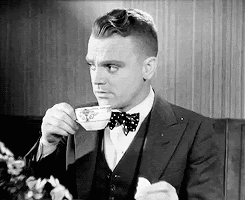This is Jimmy Cagney at his most Jimmy Cagney-est. Actually, it's more like Cagney playing Mo of the Three Stooges, if Mo was called Jimmy Corrigan (no, not that one) and ran a company which survived by producing fake heirs to the fortunes of dead millionaires (the film opens with a montage of rich folk meeting their abrupt ends in various ways, from falling off a horse to being on a train that collides head on with another train). He is very much the street tough made good through unscrupulous means (quote from the Vanity Fair review of this film: "Heartily recommended for the unethical"), with the support of his loyal if much put-upon (think Larry of the Stooges) pal/employee Lou,
and a cadre of lowlifes whom he sends out to track down plausible heirs. (However, Jimmy has some gold in his otherwise hard heart - he sees it as "doing his bit" to keep these losers employed, it being the Depression and all.) A competing business run by Charles Wallingham seems, on the other hand, thoroughly worthy, as well as being unbelievably swanky (one of the funniest scenes in the movie is Jimmy visiting Wallingham's office and being led by various flunkies into ante-room after ante-room, in each of which he is plied with endless cups of tea,
until his stomach loudly rebels). Wallingham's secretary is Bette Davis's Joan Martin, who used to work for Jimmy (and for whom Jimmy carries a torch)
until the venality became too much for her. The posh Wallingham seems entirely virtuous, insisting that they find the real heirs and only take a tiny percentage for their troubles. Jimmy suspects both that Wallingham has eyes for Joan and that he is not on the level, but nonetheless loves his setup and soon converts his office into one just as highbrow. The two offices appear to be at odds over the case of an old woman who lived off food left over by others, who meets her fate when she chews on a cyanide-laced sandwich left by somebody who committed suicide thereby. At the coroners they discover that her clothes have $200,000 worth of stocks and bonds sewn into them. Apparently her nearest potential inheritor is Monty Barton, who may be dead. His daughter is found by Wallingham, and looks to inherit, until Jimmy finds an informant (who, it is strongly hinted, is a heroin addict, desperately in need of a fix) who reveals that Monty is not only alive, but is (under an assumed name) wanted for murder. Jimmy tracks him down and suggests a scheme to him: marry the ex-lover of his victim (whom Monty swears he killed in self-defense) who is the only witness, with the promise of half the money. That way Monty escapes the chair and ends up with $100K. But first, Monty must get married to somebody else - in this case Mabel the bubbly airhead girlfriend of Lou (played deliciously by Alice White), albeit under an assumed name.
This will mean that when he then marries the witness, the marriage is invalid and she can't collect. But then when Mabel tries to collect, she can't either, because it's not her name on the marriage certificate. (But wouldn't that make the marriage to the witness valid? Best not to think too hard about it.) This whole shenanigans works, and Monty walks free, while Jimmy pockets $100K. This disgusts Joan so much she responds to Wallingham's invitation to "go away" with him with an agreement to marry him (which was not quite what he had in mind). But Jimmy thinks he can win Joan back by exposing Wallingham...
A breezy just-over-an-hour, with some great dialogue and slapstick, but also some parts that drag a little, the pacing in these old films often being rather uneven to the modern eye. But Cagney, as ever, is someone you can't take your eyes off.







2 comments:
No, it wouldn't make him guilty because he's already been tried and found not guilty--it's the old "double jeopardy" clause in the 5th Amendment--and you passed your US citizenship test?
I meant it would make the marriage to the witness valid because his previous marriage WASN'T valid.
Post a Comment